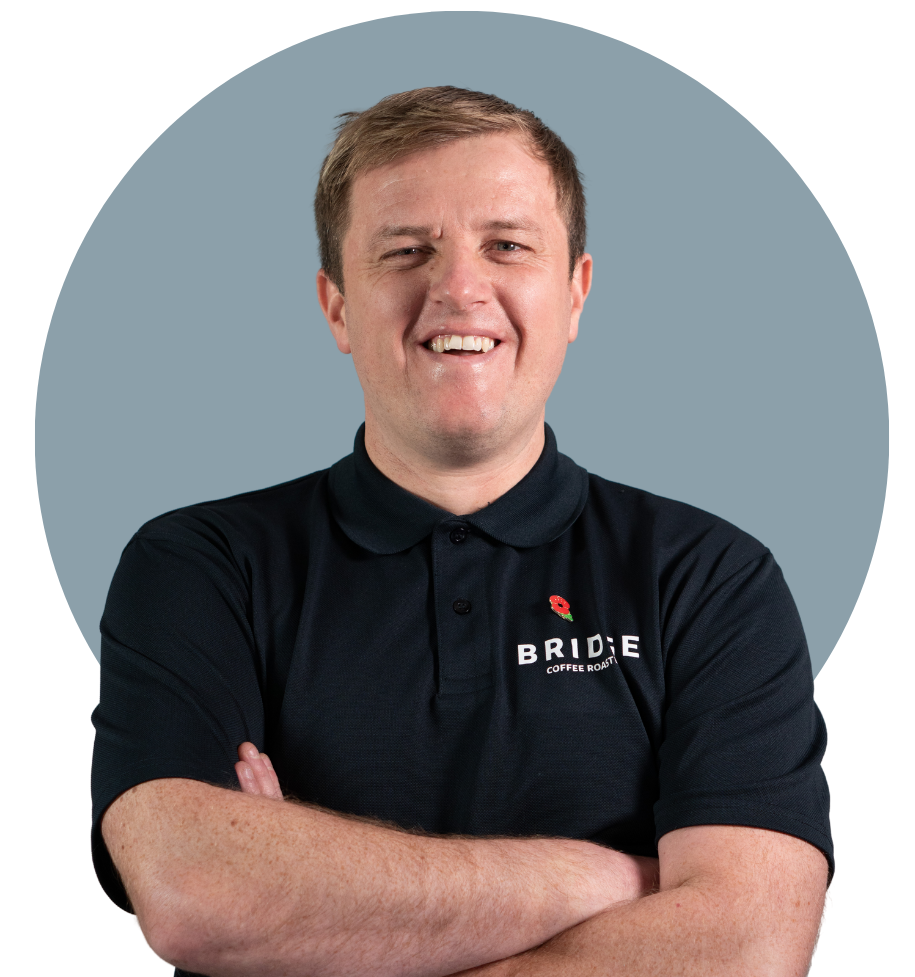13 May 2024
A Cafés Guide to BRITA Commercial Water Filters
Jack Merriman
Content Marketing Manager
Understanding BRITA’s Filtration Options for Coffee Shops
In a typical cup of coffee, over 98% of the finished drink is water. To get delicious coffee, and to protect your coffee equipment from limescale buildup and corrosion, it’s absolutely essential to use great tasting, high quality water. Here at Bridge Coffee Roasters, we have been helping businesses serve delicious coffee for many years, and know first hand how important it is to get your water correct during the installation process (Trust us, we’ve seen plenty of limescale in our time!).
BRITA are leading manufacturers of water filtration systems for coffee shops, trusted around the world for delivering high quality solutions for coffee brewing. However, finding information on which filter to use, and why, can be a little difficult. So, in this article, we’re diving deep into the topic of BRITA filter options for commercial coffee setups, and answer all of the questions you may have.
When Does a Coffee Shop Need a Filter?
There are two reasons why most coffee businesses should be treating their water using a filtration system. 1. The hardness and mineral content of your water has a large impact on the flavour and extraction of your coffee. 2. The water hardness directly correlates to the health and performance of your equipment – with hard, untreated water leading to limescale buildup and even corrosion.
Coffee businesses that want to get the most out of their coffee and equipment want to make sure that their system is flowing with good quality, great tasting water. We absolutely recommend that every businesses serving coffee has a look into their water quality and filtration requirements. Whether you need a filter, and what type of filter you need, depends on the makeup of your water straight from the source, and whether it needs softening, filtering, or additional minerals. We help all of our wholesale customers install the correct filter for their water quality whenever we install a new coffee machine, and replace them every 6 or 12 months.
Get help choosing the right filter system
Which Water Filter Does your Café Need? BRITA’s Range Explained
BRITA offers a wide range of water filtration systems for coffee and other industries. Below is our top pick for the vast majority of coffee shops around the UK: BRITA’s Purity C Quell ST range, designed to soften water for better coffee extraction and to prevent a buildup of limescale. Continue reading to learn about the other filter options and how to discover your filtration needs.
Our Top Pick for Coffee Shops – PURITY C Quell ST (reduces hardness and limescale)
For the vast majority of businesses and coffee setups in the UK, our recommended choice will be from the Purity C Quell ST range. These reduce the total hardness of your water through a four-stage system including a pre-filter, ion exchangers, an activated carbon filter, and a fine particle filter.
This range includes the C50, C150, C300, C500 and C1100 – all featuring the same filtration technology but varying in size and water volume capacity. For high volume cafes in hard water areas, we typically recommend the C1100 to ensure longevity and consistency in the quality of water produced. Smaller capacity filters are cheaper and may be better suited for soft water areas, but will need to be replaced more regularly in hard water environments.

How to Determine your Water Filtration Needs
The type of BRITA filter your coffee shop will need depends on both 1. the hardness and chemical makeup of your water and 2. the volume of water your shop will go through. Finding out which type of treatment your water needs is a relatively simple process. First, you can view the general hardness for your area in the UK by searching on the map below, provided by BRITA. This gives you a great overview of which filter you’ll need depending on your area.
You could also look into finding the exact hardness and chemical makeup of your local area by contacting your council or local water provider, or by searching your postcode on your water suppliers website. However, the makeup of water can vary from the map and your water suppliers’ reporting, so the most accurate way of determining the correct filter for your needs is to perform a quick water test.

We’ll Test Your Water for Guaranteed Accuracy
Before we install a coffee machine of any kind, we’ll perform a site survey which includes energy requirements and water testing. The water test here will help us confirm your filter needs gathered from BRITA’s UK water map. If we have installed filters in your area before and tested the water recently, additional testing may not be required.
Our coffee engineers perform the simple test using BRITA’s Total Hardness and Carbonate Hardness drop test kits. Using 5ml of their solution and adding your water drop by drop, the number of drops needed to initiate a colour change in the solution equals the number of parts per million.
We then use a conductivity reader to measure your water and, with a simple equation using the hardness tests, calculate any risk of corrosion within the system due to your water quality.

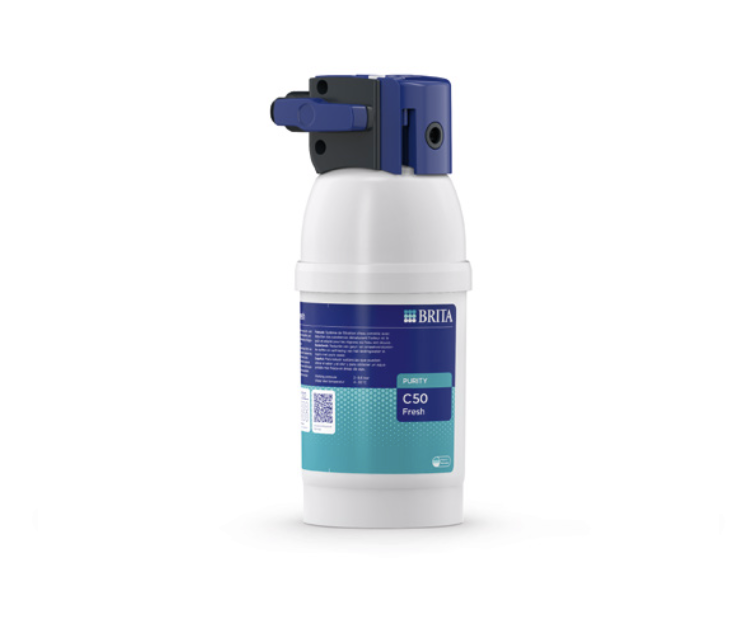
PURITY C50 Fresh
For soft water areas
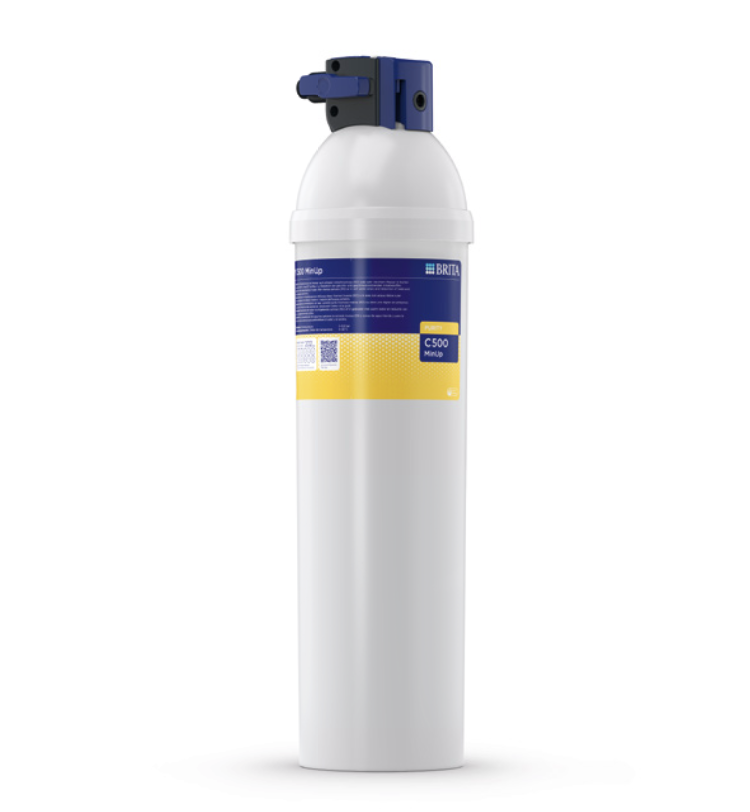
PURITY C500 MinUp
For very soft water areas
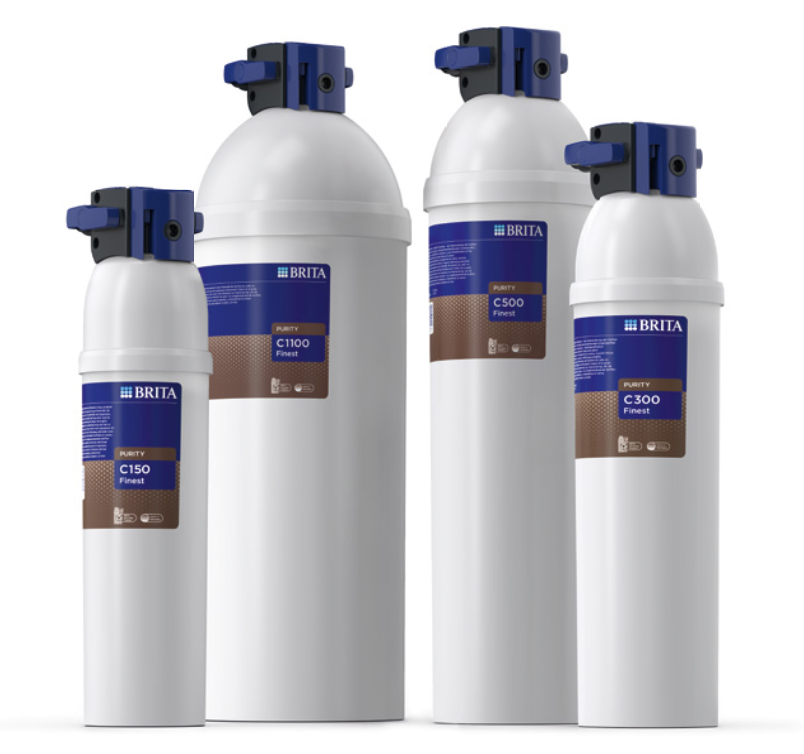
PURITY C Finest
Designed to protect against gypsum water
When to Replace your BRITA Filter?
Replacing a used filter is a simple process, draining and depressurising the system using the flush valve, disconnecting the filter head from the cartridge, replacing and connecting a new filter cartridge to the head, resetting the flow meter, and flushing the new cartridge till the water runs clear. You can easily carry out this process yourself, but is something we proactively carry out for our wholesale customers on a 6 monthly or annual basis.
The frequency at which you’ll need to replace your filter depends on both the capacity of filter you purchased, and the volume of drinks you’re serving. For the busiest coffee shops we typically work with, the largest capacity C1100 filters need replacing every 6 months. Buying the lower volume filters would require more frequent changes, so we typically advise coffee shops to buy the higher volume filters wherever possible. Low volume coffee shops can typically go 12 months without needing to replace their filters, and is part of the annual service we offer as part of our service and maintenance packages.
How Much do BRITA Commercial Coffee Filters Cost?
For our customers, 99% of the time we are installing the C300, C500 or C1100 from the BRITA Purity C Quell ST range. The cost for these start from £126 for the C300, £194 for the C500, and £231 for the C1100. On the initial installation, there is an additional charge of £54.70 for the filter head which connects your filter to the system.
Water testing, installation, and 6 monthly replacement filters are included within our gold and platinum service contracts, which also includes servicing and planned maintenance for your coffee equipment including spare parts and labour. The price for these varies depending on the type of machine, but typically ranges from £500 to £3000 per year and includes our full suite of maintenance services. To learn more about covering your filtration needs protecting your equipment with a service contract, learn more -> Coffee Machine Repairs and Service Cover.
What Does the Installation Process Look Like?
The initial installation is a relatively quick and simple process. However, to be completed properly, it does require the testing kits and access to BRITA’s professional service app. When you are setting up your coffee shop or installing a new machine, we highly recommend having your water tested and getting an experienced engineer to install your filter. For more information or to speak to our engineer team, get in touch!
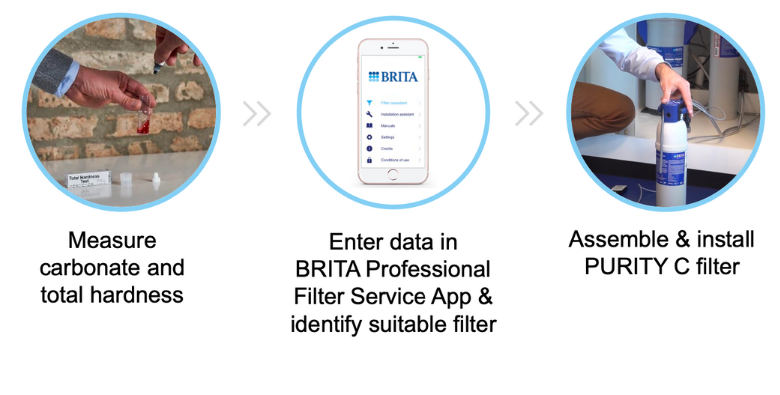
For all your Water Filtration Needs – Contact an Engineer at Bridge Coffee Roasters
Our UK-wide team of in-house engineers are ready to help with all of your water filtration needs.
Whether you need a filter installed or replaced, you’re not quite sure which filter you need, or you have any unanswered questions about water filters for commercial coffee setups, get in touch with our engineers by calling 0800 092 8992 or by filling in your details via our contact form.
